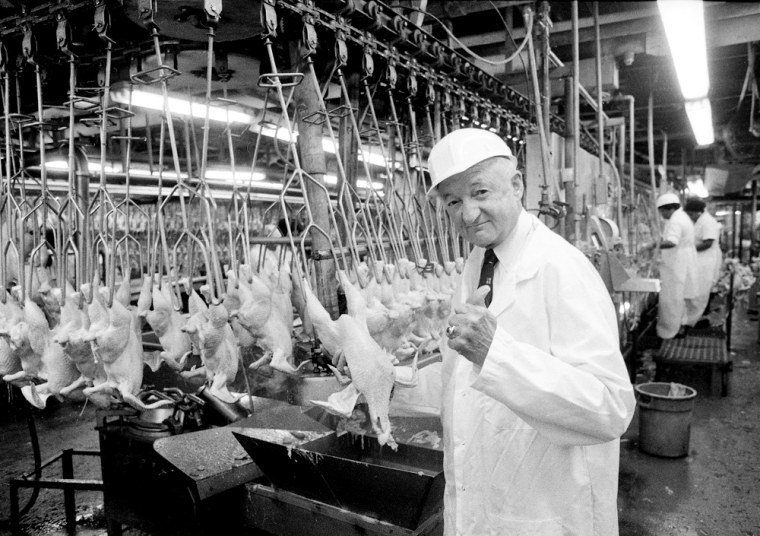With a beak-like nose, beady eyes and thin lips, Frank Perdue looked like he was born to sell chickens. It wasn’t until he put his face on TV commercials, however, that his father’s backyard egg business rapidly grew into one of the world’s largest chicken companies.
Perdue, who became famous for his folksy television pitch “It takes a tough man to make a tender chicken,” died Thursday at his home in Salisbury after a brief illness, his company said. He was 84.
Perdue was one of the first CEOs to pitch his own product on television in 1971 and remained the company’s public face for the next two decades.
In that time, he helped build an empire that now employs 20,000 associates and partners with 7,500 independent farm families. The company went from annual sales of $56 million in 1970 to $2.8 billion in 2003.
Until the late 1990s, Perdue was regularly ranked in Forbes’ list of 400 richest Americans. In 1997, it ranked him 214th and estimated his net worth at $825 million.
Perdue’s rise was extraordinary, considering the company’s humble beginnings. Perdue’s father, Arthur W. Perdue, started the family business in 1920, raising chickens for eggs. Perdue and his father switched the business from eggs to chickens in the 1940s and broke into retail sales in 1968.
“A lot of corporate America could take a lesson from Frank Perdue, a man who started out selling chickens from an ice chest in the back of his truck,” said John Boyd, president of the National Black Farmers Association, who sold chickens to Perdue for 13 years. “We didn’t always agree, but he was a good business man, he was fair, and he was responsive to the needs of his growers.”
At the time of his death, Perdue was chairman of the executive committee of the board of directors of Maryland-based Perdue Farms. He had handed over control of the company to his son, Jim, in 1991.
In building his poultry business, Perdue was the consummate entrepreneur and workaholic, who would put in 18 hours a day and get by on three or four hours’ sleep. He had a cot in his office and often spent the night there, even though his home was 50 yards away.
Perdue said he was initially uncertain about whether to take to the airwaves. He said a New York ad man persuaded him to run his own commercials, but also gave Perdue a warning.
“He said, ’If you do this, you’re going to have some heartaches from it. You’re going to have people yelling at you or maybe screaming at you or criticizing you, but I think it’s the best way to sell a superior chicken, which I think you have,”’ Perdue said in a 1991 interview with The Associated Press.
“It was quite a shock to my nervous system because I’d never been in a school play or anything and I’m basically reticent about speaking in public,” said Perdue, who ultimately did 156 different ads.
Perdue Farms’ expansion in the 1970s was rapid, but it also sowed the seeds of worker discontent. The company opened new plants in rural, often-poor areas of the South, where labor was cheap. Inevitably, union activism sprang up, which Perdue sought to suppress.
In 1986, Perdue admitted to a presidential commission that he had twice unsuccessfully sought help from reputed New York crime boss Paul Castellano to put down union activities, actions he later said he regretted deeply.
In the late 1980s, reports of repetitive motion injuries rose rapidly in the industry among workers who performed the same handling, sorting and cutting tasks all day. In 1991, the company agreed to establish a four-year program to reduce injuries.
Perdue was born in Salisbury in 1920, the only child of older parents. He was a shy boy who spent much of his time working on the family egg farm. His dream was to play professional baseball, but he said he “gathered more splinters than hits” on the team at Salisbury State Teachers College, from which he graduated in 1939.
Perdue’s loyalty to his hometown remained throughout his life. He was heavily involved in civic activities and gave an endowment to his alma mater, now Salisbury University, to establish the Perdue School of Business.
Perdue is survived by his third wife, Mitzi Ayala Perdue, four children, two stepchildren and 12 grandchildren.
